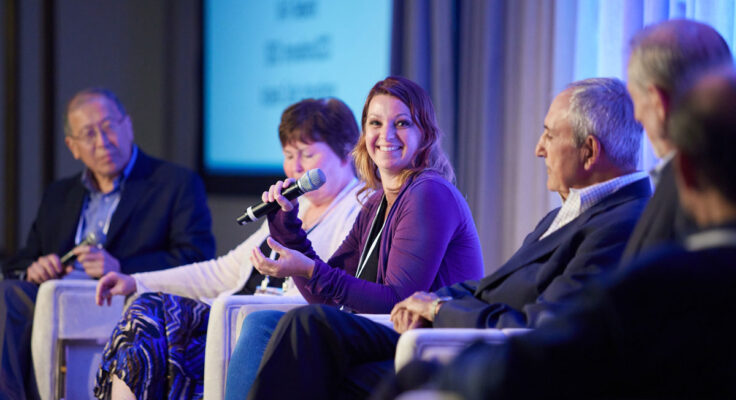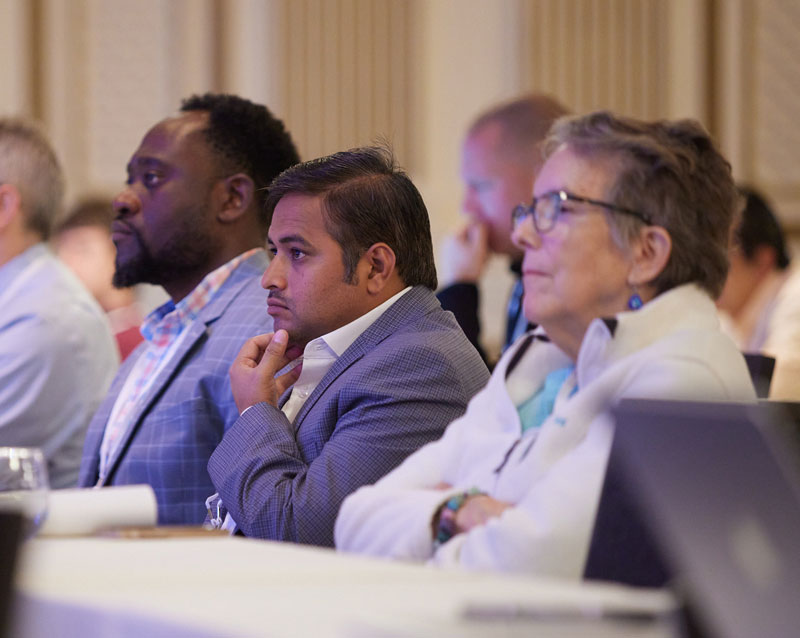
In July, the Kenneth Rainin Foundation’s annual Innovations Symposium brought together scientific minds from around the world to promote cutting-edge thinking about Inflammatory Bowel Disease (IBD). We were thrilled to bring attendees to San Francisco and meet in person for the first time since 2019.
Over two days, more than 160 researchers, clinicians and industry professionals heard the latest science and exchanged fresh insights to understand this complex disease. Attendees’ enthusiasm for face-to-face conversations animated our twice-daily poster and networking sessions, which play an important role in seeding new ideas and collaborations.
It was incredibly rewarding to share space in person again, and to combine outstanding presentations and panel discussions with ample time for networking and exchanging ideas one-on-one.
Laura Wilson, PhD, Director, Health Strategy & Ventures, Kenneth Rainin Foundation
Exploring The Intricate Factors Influencing IBD
Our keynote speakers included seasoned experts and emerging innovators who presented on the intricate mix of factors that influence IBD. Their research spanned dietary therapies, how gut microbes co-exist, allergy, the interplay of skin bacteria and colitis, even circadian rhythms. Key presentations revealed unexpected connections and new immunological avenues for understanding and treating IBD and advancing patient well-being:
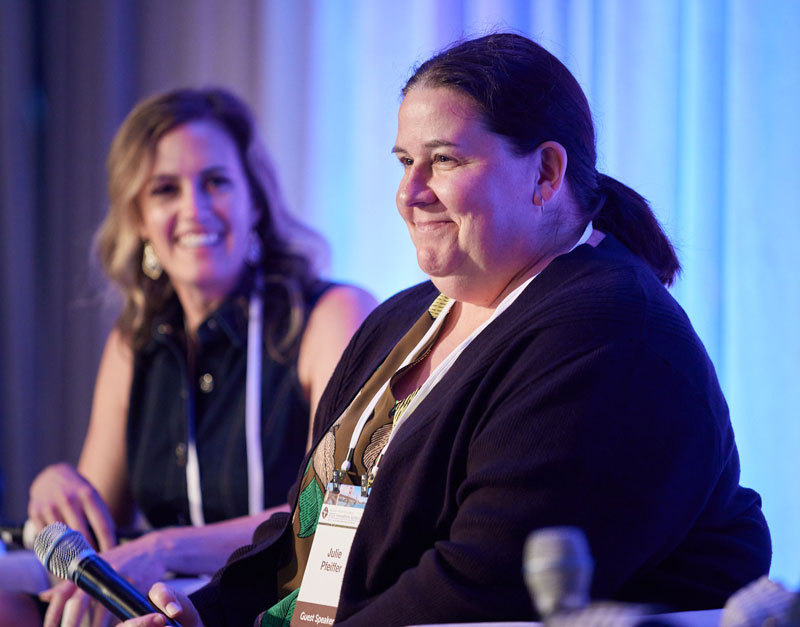
- Meghan Koch, PhD, Fred Hutch Cancer Center, investigates maternal-fetal interactions, seeking to identify novel pathways that regulate neonatal health. Her lab has shown that maternal antibodies transmitted from mother to offspring ‘instruct’ mucosal immune responses in newborns.
- June Round, PhD, University of Utah School of Medicine, explores causal associations between gut microbes and health. Her lab analyzes an array of microbes including bacteriophages, fungi and bacteria to uncover the mechanistic underpinnings of how these organisms influence disease.
- Daniel Mucida, PhD, Rockefeller University, focuses on the interplay of resistance and tolerance in the intestine’s mucosal immunology. His lab studies how the intestine generates protective responses against invading pathogens while absorbing beneficial microbe- and food-derived molecules.
- Tiffany Scharschmidt, MD, University of California, San Francisco, delves into the dialog between skin bacteria and the adaptive immune response during colitis. Her lab studies the cellular and molecular mechanisms mediating that interaction to elucidate the role of microbes in skin homeostasis and inflammatory skin disease.
- Julie Pfeiffer, PhD, University of Texas Southwestern Medical Center, investigates the effect of circadian rhythms on enteric virus infection. Her lab uses genetics and viral model systems to explore complex interactions between viruses and gut microbes.
Rainin Foundation Scientific Advisory Board members guided question-and-answer sessions and lively panel discussions that connected the Symposium’s varied perspectives.
Honoring Leadership
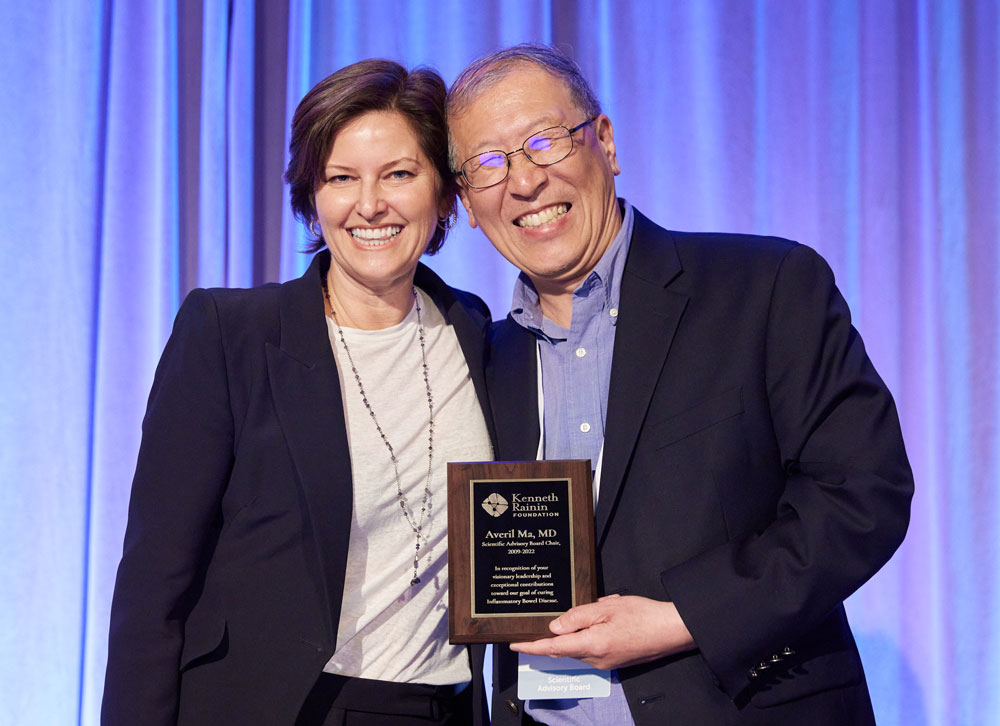
The Symposium included a key tribute to Dr. Averil Ma, who has been a scientific advisor to the Rainin Foundation for nearly two decades. CEO Jen Rainin, PhD, presented him with a special plaque honoring his legacy of insight, guidance and unwavering advocacy for early stage research ideas and translational science.
Creating A Platform For Cross-Generational Exchange
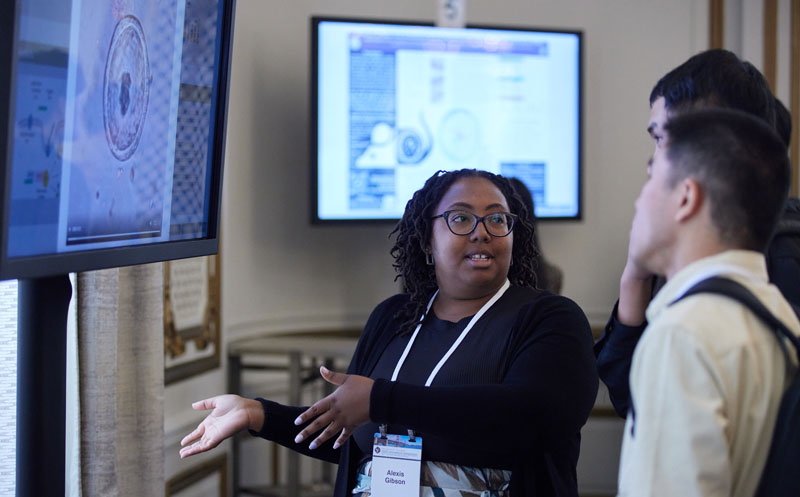
The Rainin Foundation has a long tradition of investing in the researcher pipeline. Our Innovations Symposium is a key strategy in our work to advance the field by supporting early-career scientists. The Symposium’s design enables these investigators to network and learn from leaders in the field.
This year, more than one-third of attendees were graduate students and postdocs, with an additional one-third of attendees identifying as early- or mid-career scientists. Many graduate students and postdocs presented research posters at the event and benefited from our travel awards, which cover registration fees, lodging, airfare and ground transportation. Due to a record number of poster abstract submissions, we doubled the number of travel awards.
We value the attendance of trainees and postdocs and aim to support their research progress and career development. A robust pipeline is essential to the future of science.
Researchers Share Novel Insights And Promising Advances
Following is a full list of speakers who presented research insights and progress:

- Yasmine Belkaid, PhD, Chief, National Institute of Allergy and Infectious Diseases, Microbiome Control of Host Immunity
- Julie Blander, PhD, Professor, Weill Cornell Medicine, Sensing inflammatory damage to the intestinal epithelium
- Meghan Koch, PhD, Assistant Professor, Fred Hutch Cancer Center, Maternal IgG programs host-microbiota mutualism in early life
- Richard Locksley, MD, Professor, University of California, San Francisco, Innate Allergy and Small Intestinal Homeostasis
- Sarkis Mazmanian, PhD, Professor, California Institute of Technology, Brain Connections in a Mouse Model of Parkinson’s disease
- Daniel Mucida, PhD, Professor, Rockefeller University, CD4 T cell responses to food
- Julie Pfeiffer, PhD, Professor, University of Texas Southwestern Medical Center, Circadian control of enteric virus infection
- Fiona Powrie, PhD, University of Oxford, Translating immunology into new therapies for Inflammatory Bowel Disease
- June Round, PhD, University of Utah School of Medicine, Adaptive immunity promotes mutualism between commensal fungi and host
- Tiffany Scharschmidt, MD, Associate Professor, University of California, San Francisco, Living at peace with our skin bacteria: early lessons and complexities during colitis
- David Suskind, MD, Professor, University of Washington School of Medicine, Diet in IBD: the Role of Nutrition in Immune Balance
